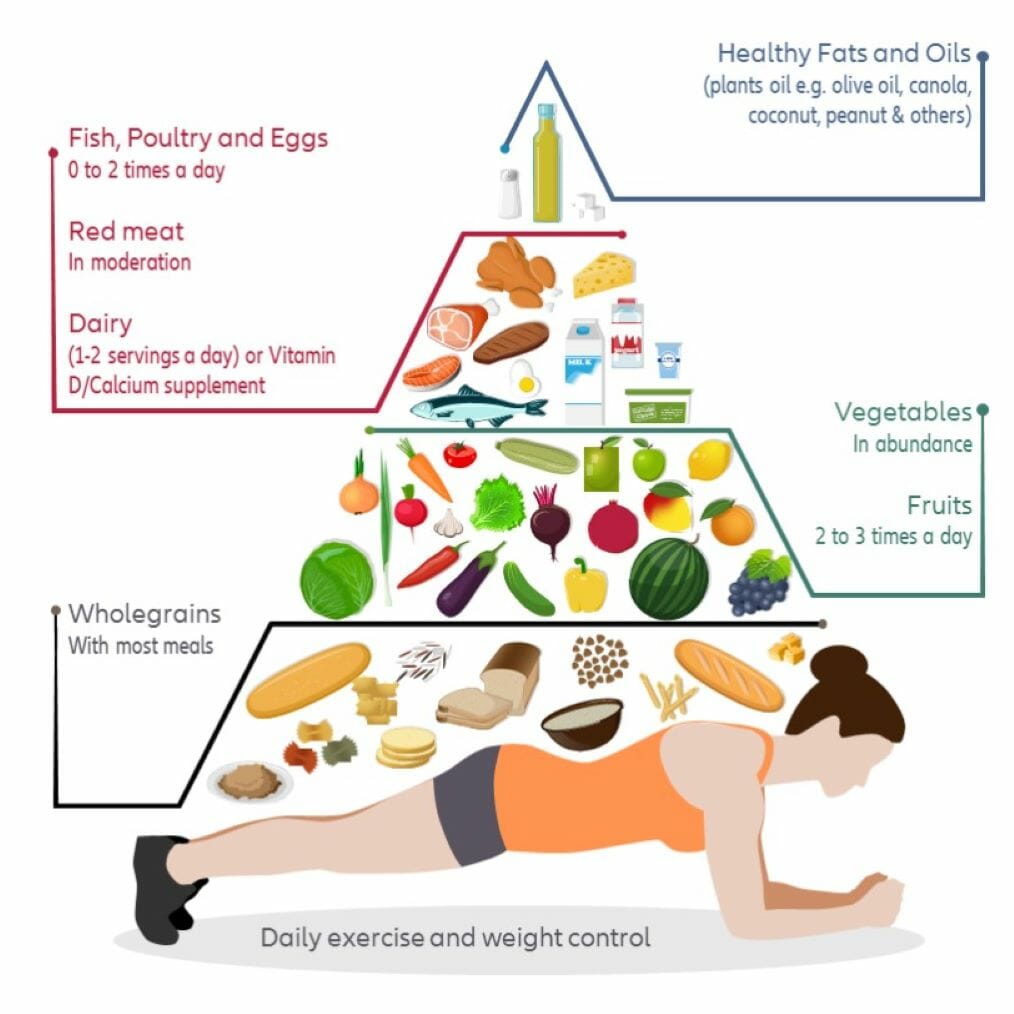OSHCstudents – In Australia, you may not have access to the same types of food and produce you had at home, so you may need to adjust your eating habits slightly. Australia’s diverse, multicultural society means you can find a variety of food from different cultures around the world. To help you adapt to your new lifestyle, we’ve put together some information to help you eat well while you’re here.
What is a healthy diet?
A healthy diet is about getting the nutrients that your body needs for energy, improving and maintain your health, and to make you feel good.
It doesn’t have to be complicated or mean that you deprive yourself. Instead, it’s about knowing what your body needs and consuming everything in moderation.
The below Food Pyramid provides a guide to what a healthy diet looks like. The widest part at the bottom are foods that can be eaten with most meals. The foods at the narrow top are those that should be eaten sparingly, if at all.

What should your plate look like?
Try to include as much variety in your meals as possible. The Australian Dietary Guidelines recommend eating a wide variety of fresh, nutritious foods.
We get as much joy from how beautiful food looks as we do from how it tastes and a variety of colours and textures on the plate holds a lot of visual appeal.
Fruit and vegetables naturally have an enormous range of colours and textures that entice our tastebuds. Be sure to include a variety of different types of fresh vegetables and fruit at every meal, choosing from what’s in season at your local supermarket or fresh produce outlet.
To receive all the essential nutrients you need for good health, it’s also important to include a variety from across the five different food groups. So, while fruit and vegetables should form the main part of our diet, it’s also important to include grains, lean meats, poultry, fish, eggs, and dairy in our diet every day. Why not experiment with different types of pasta, rice, and other grains like polenta and quinoa? You can even vary the types of bread you use for sandwiches, mixing it up with rolls, wraps, rye bread, or sourdough.
Following the guide below, will assist in balancing your diet as well as getting your portions right for each meal.

Practical Tips for Healthy Eating
Start the day right
Eating a nutritious breakfast each day will help you to feel better, perform optimally in the classroom or workplace, as well as cope better with stress. A healthy breakfast can be:
- Porridge or wholegrain cereal with low-fat dairy (milk or yoghurt) and a portion of fruit
- Wholegrain/wholemeal toast with avocado or low-fat margarine and a spread, such as jam, honey, or vegemite
- A hot breakfast – poached/boiled egg, grilled tomato/mushrooms, or baked beans
Eating plenty of fresh fruit and vegetables is one of the easiest ways to help you maintain good health.
Fruit and vegetables contain lots of the vitamins and minerals that our bodies need to protect us from all sorts of illnesses, from colds and flu to more serious diseases like heart disease and Type 2 diabetes. The nutrients and antioxidants in fruit and vegetables are great for glowing skin, and strong teeth and nails. Fresh fruit and vegetables are also full of fibre, which helps with digestion.
Together with fresh fruit and vegetables, we also need to include food that contains grains, lean meat, fish, eggs, nuts, seeds, legumes, and dairy.
In Australia, there are plenty of ways to purchase fresh produce, including supermarkets and fresh food markets – with both having options to purchase online for delivery if needed.
Eating Out
No matter where you are in Australia, you’ll find plenty of restaurants in a variety of cuisines – from Chinese, Indian, and Thai to Greek, Italian, Middle Eastern, and more.
While you have a lot of choice, keep in mind that dining out for every meal can be expensive and may not be the healthiest option.
Try to avoid deep-fried options, limit high fat, high salt sauces or toppings, and include extra vegetables. Choose smaller portions or share a meal with someone else.
Tasty Treats in Moderation
It’s often tempting to have a sweet treat with your mid-morning cup of tea or coffee. Or to have dessert after dinner. Friday night drinks with your colleagues at the local pub or wine bar can be an appealing way to end a long week.
Alcohol, soft drinks, and foods that contain a lot of sugar, salt, and saturated fats are generally low in essential nutrients and fibre and are often too high in energy levels. While we might love the taste sensation, these types of foods generally bring us little or no benefit nutritionally, contribute to unwanted weight gain and are associated with increased risk of obesity and chronic diseases like heart disease, stroke, Type 2 diabetes, and some forms of cancer when consumed in large quantities.
It’s very easy to have too many of these types of foods and drinks too often – because they taste so good! However, we should consider them as treats for special occasions and only consume them sometimes, keeping the serving size small.
Buying International Food
Your local grocery store may stock aisles dedicated to international foods as well as have Kosher or Halal options.
You will also find specialty supermarkets that have a more extensive selection of imported foods from different parts of the world.
Cooking at Home
The great thing about cooking meals is that you can plan your meals for the week in advance. If you’re living in a share house, you can also consider sharing cooking responsibilities with your housemates.
Try to:
- Always use fresh produce where possible
- Read food labels so you know what you’re eating
- Reduce the amount of processed and packaged food
- Buy frozen fruit or vegetables so you always have these on hand
- Keep a collection of cheap, healthy recipes
How to Eat Nutritious Meals on a Budget
Healthy eating doesn’t have to be expensive, here are a few tips to help save money on your food spend:
- Plan healthy meals and snacks for the week
- Consider what you already have in your pantry before shopping
- Eat fruit and vegetables that are in season and look out for grocery and market specials (usually advertised on food outlet websites)
- Try to avoid shopping for food when you are hungry as you may end up purchasing expensive, and unnecessary snack foods.
- Make a grocery shopping list
- Limit your intake of alcohol and treats to once a week or on special occasions.
- Drink water instead of sugary sweetened soft drinks.
- Try substituting half of the meat in some dishes with legumes or extra vegetables
- Meal leftovers can be used for lunch the next day or frozen for later use
Benefits of a well-balanced diet
Eating a healthy and well-balanced diet can help:
For more information about diet and nutrition in Australia, visit the Eat for Health website.
You are international students or foreigners arrive to Australia, or Australian citizens traveling abroad who are looking for OSHC, OVHC, travel insurance, please contact OSHCstudents Team at email: info@oshcstudents.com and our partners for further information and assistance.
OSHCstudents (source: Allianz Care Australia)














